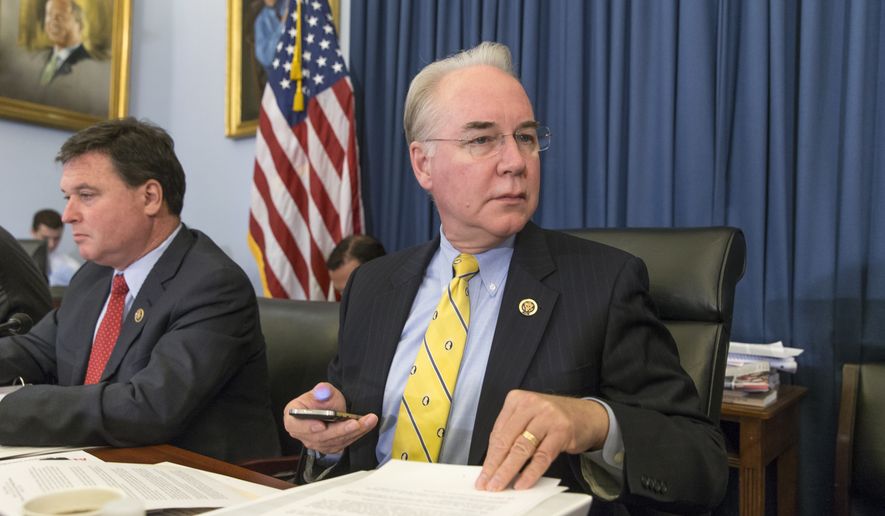The House Budget Committee approved a 10-year spending plan Wednesday that might still be doomed, as Republican leaders who raved about its policy goals still face objections from rank-and-file conservatives who oppose spending levels the parties agreed to last fall.
Chairman Tom Price, Georgia Republican, said the proposal that advanced to the full chamber, 20 votes to 16, would put the nation’s fiscal house in order by paring back federal agencies, revamping Medicare and repealing Obamacare, but without shortchanging defense.
It is a plan “that would send power back to the states, that would prioritize the responsibilities of the federal government, like national security, and save and strengthen those programs that are critical to the health, retirement and economic security of millions of Americans,” he added, kicking off a marathon markup of the blueprint.
The plan faces a floor fight from within the Republican Party at large, however, because it adheres to the higher spending levels President Obama is seeking instead of slashing about $30 billion in discretionary funds.
The House Freedom Caucus says the House should have cut spending to $1.04 trillion in 2017 — the level it would have been under a 2011 budget deal. Yet then-Speaker John A. Boehner, Ohio Republican, and Mr. Obama last year rewrote that deal, adding tens of billions of dollars more in 2016 and 2017.
Current Speaker Paul D. Ryan of Wisconsin pleaded with fellow Republicans to abide by the agreed-upon levels and pass additional cuts alongside the plan, though the Freedom Caucus resisted that plan.
Two Freedom Caucus members — Reps. Dave Brat of Virginia and Marlin A. Stutzman of Indiana — were the only Republicans to vote against the plan, underscoring the problems the plan could still face.
“You’ve got 80 percent of the Republicans voting [in the party primaries] for outsiders over the last few weeks now, and they want to see some stark changes in direction,” Mr. Brat said in a hallway interview, arguing that trillion-dollar problems are being met with billion-dollar solutions.
Mr. Ryan, who promised to empower the rank and file as speaker, has said he will listen to the caucus’ concerns as the process moves forward.
Rep. Jim Jordan, Ohio Republican and prominent member of the Freedom Caucus, also left the door open to negotiations.
“Conservatives have taken a strong public stand against this budget, but we still want to work with House Republican leadership to pass a stronger budget with lower spending levels and conservative policies that reflect Republican priorities moving forward,” he said.
The budget is nonbinding, but it serves as an outline Congress follows as it writes the dozen annual spending bills that fund most basic operations of government. Congress didn’t even pass a budget from 2010 through 2014 and relied instead on deals such as the 2011 debt agreement and October’s debt deal to set spending limits.
Committee Democrats fumed Wednesday as Republicans voted down their attempts to preserve the Affordable Care Act, set aside $1 billion over two years to combat the opioid crisis and send more than $450 million in emergency funding to residents of Flint, Michigan, who are reeling from lead-tainted water.
More broadly, they said, the budget would upend Medicare, roll back health care services for women and make it harder for students to afford college.
“If you’re at the very top of that economic ladder, if you’re at the top 1 percent, this is a great budget for you,” said the committee’s top Democrat, Rep. Chris Van Hollen of Maryland. “But if you’re anybody else — if you’re a struggling working family, if you’re a senior on Medicare, if you’re a student trying to go to college and come out debt-free, this budget hits you squarely between the eyes.”
Meanwhile, the intraparty standoff poses the next big test for Mr. Ryan, who is trying to move beyond the past few years, when Mr. Boehner and his chief aides often scrambled for votes to approve eleventh-hour spending deals.
The upheaval also threatened to upend plans by Senate Majority Leader Mitch McConnell, Kentucky Republican, to get down to basics and prove it can pass all 12 appropriations bills in a topsy-turvy election year.
Senate Democrats have signaled that they will not help the process unless Republicans abide by the spending pact struck last fall.
The Senate Budget Committee said this month that it will postpone any action on a fiscal 2017 budget, signaling that the chamber will turn directly to the appropriations process under the existing deal.
• Tom Howell Jr. can be reached at thowell@washingtontimes.com.




Please read our comment policy before commenting.